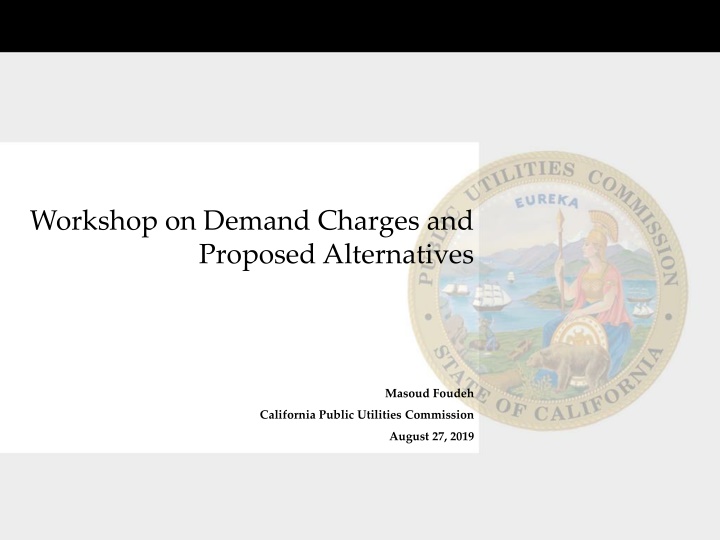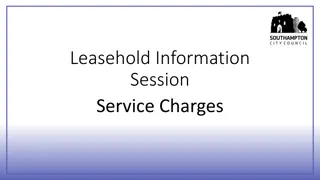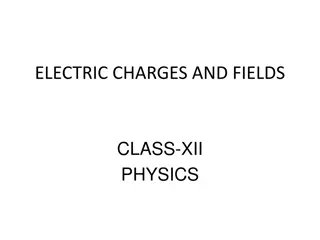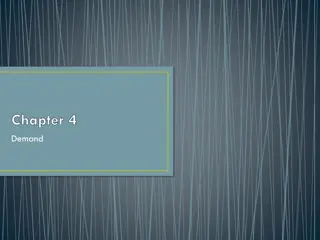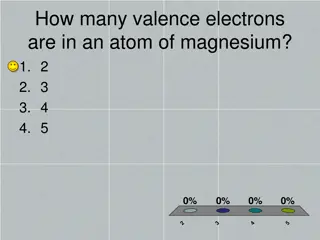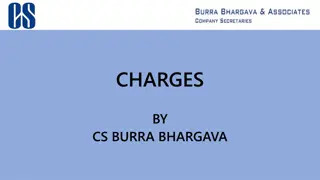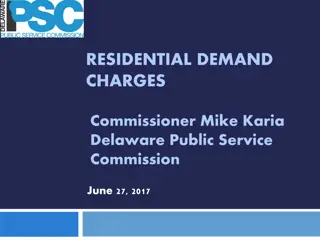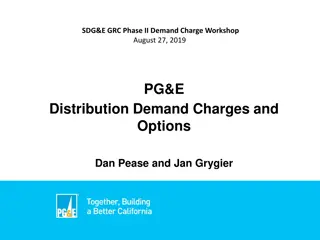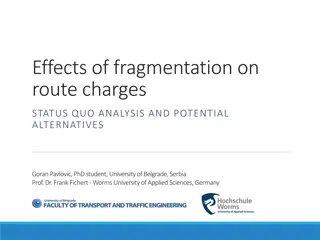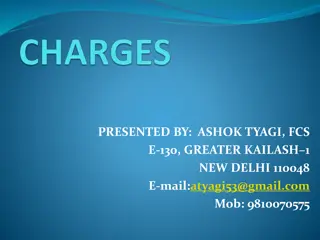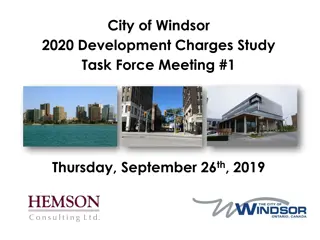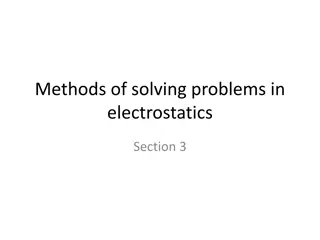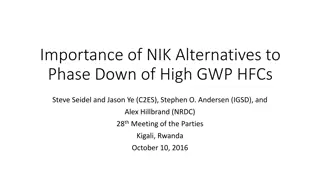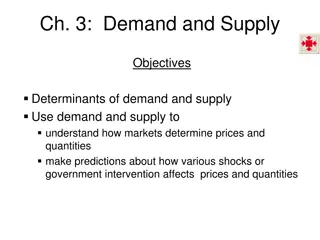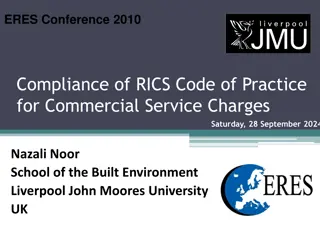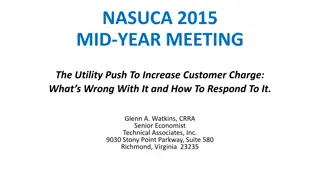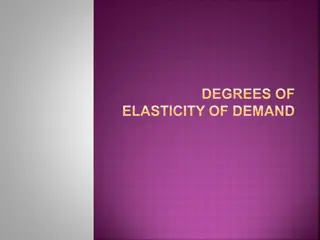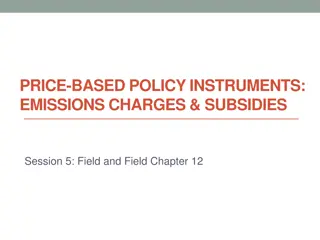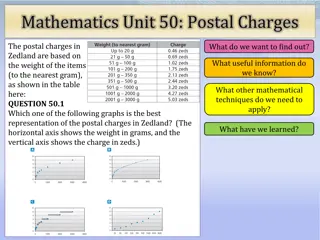Workshop on Demand Charges and Proposed Alternatives
This workshop focuses on evaluating existing demand charge structures and presenting alternatives to current methodologies, with a goal to align principles with Commission policy goals. Past decisions and outcomes from various proceedings are discussed, including recent petitions for rulemaking.
Download Presentation

Please find below an Image/Link to download the presentation.
The content on the website is provided AS IS for your information and personal use only. It may not be sold, licensed, or shared on other websites without obtaining consent from the author.If you encounter any issues during the download, it is possible that the publisher has removed the file from their server.
You are allowed to download the files provided on this website for personal or commercial use, subject to the condition that they are used lawfully. All files are the property of their respective owners.
The content on the website is provided AS IS for your information and personal use only. It may not be sold, licensed, or shared on other websites without obtaining consent from the author.
E N D
Presentation Transcript
Workshop on Demand Charges and Proposed Alternatives Masoud Foudeh California Public Utilities Commission August 27, 2019
Objectives for this Workshop 1. To provide parties with an opportunity to evaluate existing (legacy) Demand Charge structures, and to present alternatives to SDG&E s current DC methodology. 2. To discuss and establish consensus about the appropriate principles and objectives of demand charge methodology in light of Commission policy goals and an evolving grid. 3. Expected Outcomes: All Party Workshop report that includes: Realistic alternatives for DC reform Next steps describing detailed action plans to evaluate alternatives and implementation options. 2
Commissions Past Decisions on DCs D.14.12.080 The Commission questioned the accuracy of Peak and Part-Peak Demand Charges as a proxy for contributions to Coincident Peak Demands. The Commission found Option R was of value and ordered PG&E to offer it. Option R allows solar customers to substitute TOU rates for demand charges. D.18.08.013 (PG&E 2016 GRC 2) Heavy reliance on non-coincident demand charges (NCDs) is generally disfavored by our historic rate design principles because NCD charges do not reflect cost causation for primary distribution, transmission, or generation capacity costs. Rate designs that heavily rely on NCD charges also promote inefficient use of energy contrary to state policy goals encouraging economically efficient and socially beneficial energy usage. NCDs can discourage beneficial energy use, such as electric vehicle fleet charging (overnight or during hours with high solar generation), or Reverse Demand Response to encourage customers to use renewable energy that might otherwise be curtailed due to over-generation conditions. 3
Commission Decisions on DCs SDG&E 2016 GRC Phase 2 (D.17.08.030): NCDC 65% 85% CD 35% 15% Prior to the Decision SDG&E Proposal Final Decision 39% 61% Ratio of Distribution Related costs not recovered through monthly service fee PG&E 2016 GRC Phase 2 (D.18.08.013) Commission rejected PG&E s proposals to increase NCD but approved the settlement on condition that a small amount of cost recovery was shifted from NCD to CD. Approved option S (for Storage), which has higher volumetric rates and lower demand charges that are coincident and daily. SCE 2017 GRC Phase 2 (D.18.11.027): The Commission approved settlement shifting significant portion of distribution revenue collection from NCD to CD and TOU energy charges. 4
Petition for Rulemaking (A.18.11.004) A Petition for Rulemaking (PFR) was filed* in November 2018 in order to develop consistent and explicit policies on Real Time Pricing (RTP) and Demand Charges. Regarding Demand Charges, the petitioners* asked the commission to: Prohibit use of NCD. Move from a monthly DC to other alternatives such as daily DC. In D.19.03.002, the Commission denied the PFR on procedural grounds but invited petitioners to raise the same issues in upcoming GRC proceedings. SDG&E is the first GRC phase 2 proceeding since the petition was denied. * PFR was filed by CALSSA, SEIA, Enel X, CESA, Engie, OhmConnect and Stem.
Question from the Commission: Do SDG&E s current Demand Charges align with Commission policies? Peak load shifting and other grid support objectives Cost causation principles in rate making Reducing greenhouse gas emissions Ensuring appropriate utility cost recovery Enabling demand-side load management solutions Are there alternatives to SDG&E s current Demand Charges that better meet the Commission s policy objectives? If yes, what should be the criteria or objectives for evaluating the alternatives? 6
Workshop Agenda Session Presenter Time Opening Remarks Commissioner Shiroma 10:00 10:05 AM Workshop Goal and Objectives Masoud Foudeh (CPUC) 10:05 10:15 AM A Comparison of Demand Charge Alternatives Ryan Mann (Enel X) 10:15 10:45 AM Tom Beach Alternatives to Traditional Demand Charges 10:45 11:15 AM (Solar Energy Industries Association) Break 11:15 11:20 AM Discussion of Alternative Demand Charge Proposals and SDG&E s August 12 filing Bill Saxe and Gwen Morien (SDG&E) 11:20 11:50 AM Recent and upcoming changes in SCE s Demand Charge Rate Structures. Robert Thomas (SCE) 11:50 12:10 PM Demand Charge Design and Option S. Daniel Pease (PG&E) 12:10 12:30 PM Lunch (not hosted) 12:30-1:30 PM Tom Beach (SEIA) Ryan Mann (Enel X) Scott Murtishaw (CALSSA) Daniel Pease (PG&E) Bill Saxe (SDG&E) Robert Thomas (SCE) Cathy Yap (CLECA) Masoud Foudeh (CPUC) 1:30 3:30 PM Panel Discussion and Q/A Summary and Next Steps 3:30-3:45 PM 7 Closing Remarks Commissioner Shiroma 3:45 PM
